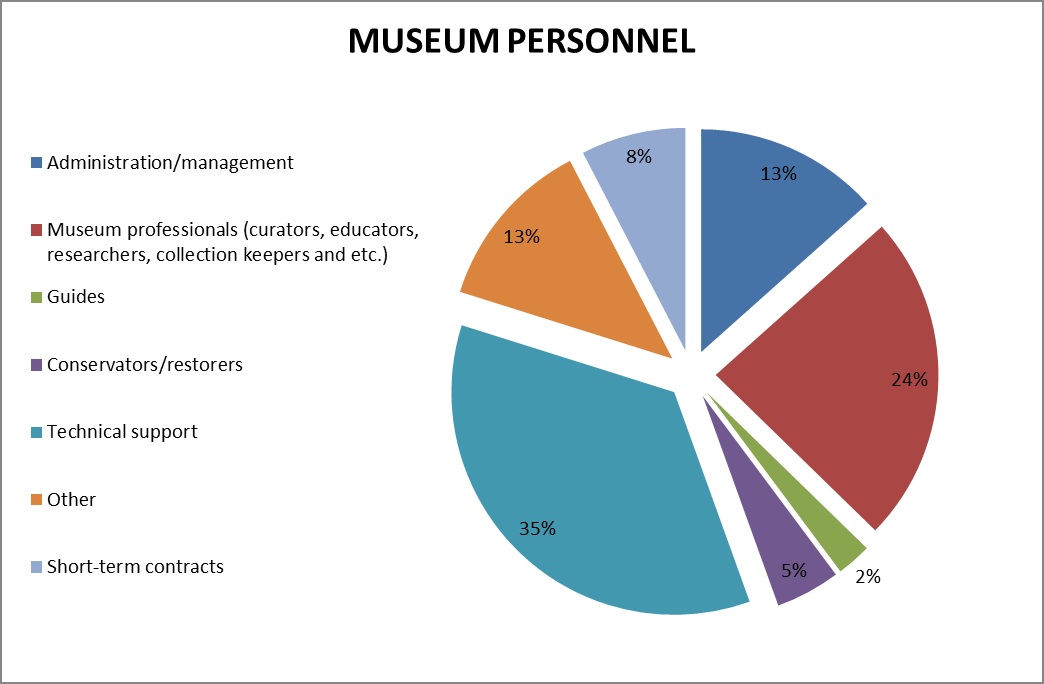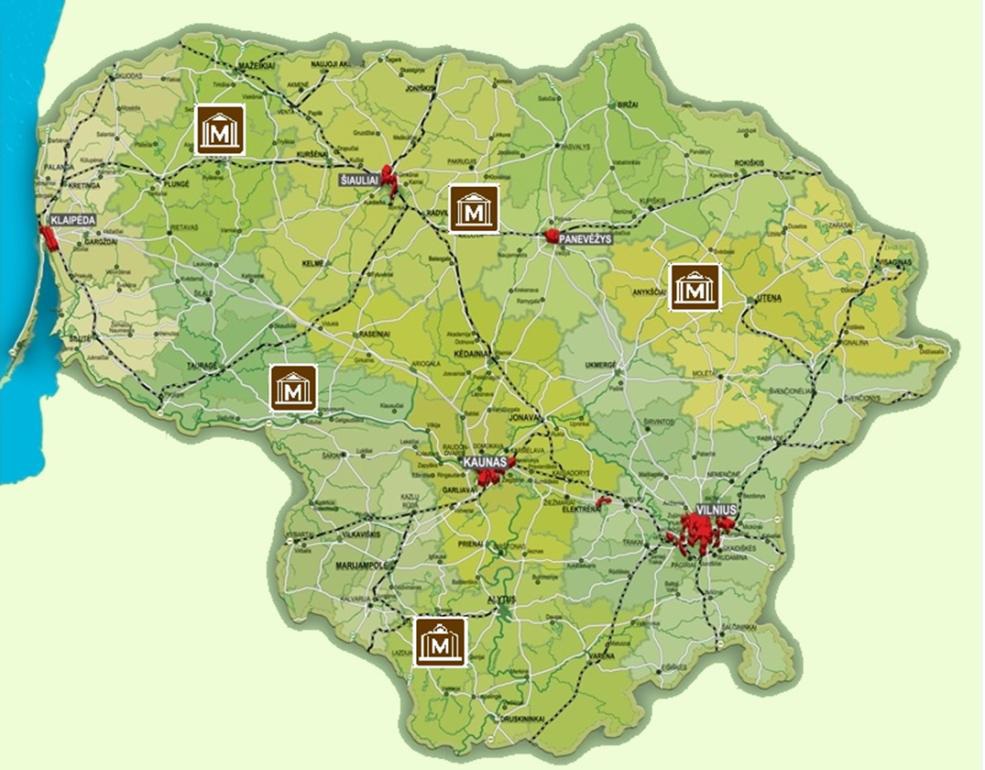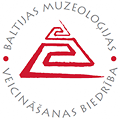- LAT
- ENG
- РУС
Driven by Passion. What Does It Means To Work In The Museum

Vaiva Lankeliene
Chief Officer
Information Society Development Division
Cultural Policy Department
Ministry of Culture of the Republic of Lithuania
After 11 years of working in the museum I have moved to Vilnius and now working for the museums as chief officer in the Information Development Division of the Ministry of Culture of the Lithuania Republic. Today, I would like to share my thoughts and insight about my colleagues, people who work in the museums and for the museums and what does it means for all of us to work in the world of museums.
When I think about the “museum”, I usually have in mind people, because museums were created by people and for people. And for me personally, the most important thing in the museum is not the building, the collection, researches or even education. The most important element of the museum for me is hosts - people, who work in the museum and for the museum.
Museum definition, which I am used to have in mind is the ICOM definition, which states, that “Museum is a non-profit, permanent institution in the service of society and its development, open to the public, which acquires, conserves, researches, communicates and exhibits the tangible and intangible heritage of humanity and its environment for the purposes of education, study and enjoyment. (ICOM, 2007) Many countries use this definition to identify their museums and some of them adapted it to their national law, as usually means just using only different words. But the main and basic things stay the same: collecting, conserving, researching, exhibiting, education. Museum itself can’t do it, so, who are those engines which make museums work?
And then we “discover” people, museum personnel - employees of the museums, who perform functions related to the collecting, recording, conservation, protection, research, display, promotion and interpretation of the tangible and intangible cultural heritage and nature objects and of the great responsibility, delivered to the museum personnel to fulfill the job, which requirements usually are higher than average.
The museum sector in Lithuania is quite large and vibrant element of the cultural and tourism economy that provides hundreds of jobs throughout country. Today in Lithuania we have 103 museums, among which there are 4 national, 12 state and 64 municipality museums. To count private museums and museums, established as departments in the enterprises is quite difficult, therefore the total number of museums and people working in them is sometimes indecisive.
Museums today are lively places in which we all have the opportunities and challenges to work with interesting and engaging displays and contents, busy schedules of events and front-of-house staff to meet and greet visitors. Therefore, in many museums, some jobs require specialized training, while others need a basic education and common sense.

Pic. No. 1 Staff structure in Lithuanian museums
The museum community in Lithuania are people – mostly full-time, some part-time, temporary and even voluntary – who work in museums and aid this social, leisure, learning and economic process. According the national statistics of 2012, the total number people working in the museums was 3055. The largest number of museum staff is from the technical support divisions, but the museum professionals (incl. curators, educators, researchers, collection keepers and etc.) also are quite big and the most important part of the museum staff structure(Pic. No. 1).
To have clearer view of the present situation related with the development of the museum professionals qualification, I have looked through the some of the national and international regulations for the museum personnel.
In Lithuania we have national document, which sets priorities and main requirements for the training of the museum professionals in Lithuania – “Long – term training regulations of the museum professionals in Lithuania”. It came into force 29th October 2008 and till now has not been changed or improved. But, despite that, this document can be used as background for starting planning museum professional training programes or capacity building projects. It includes the situation analysis, which by all means should be updated, as well as the main priorities of the museum professional training, which are:
- museum management skills and administrative capacity development;
- development of the museum collection management skills (planning, selection, research and digitalization of museum collections, preparation and implementation of the permanent and temporary exhibitions, educational programmes);
- development of the visitors services providing skills and communication with the public skills;
Vision of the museums staff capacity building in Lithuania could be officially declared as - Knowledge, Awareness and Responsibility of each member of staff in the museum.
But, what we would like to be or imagine how it should look like, not always means that it is so in reality. Museum jobs are low paid and because of the high professional requirements and high responsibility we are always walking on the edge of the conflict and fear of loosing highly qualified specialists. The conflict between the high responsibility for the society and low salary indeed does not creates motivation for museum personnel and therefore we have to work out many different motivation systems to keep museum professionals working and deliver values as it is said in the missions of their museums.
Other challenge, which museum professionals are facing to, is the image of the people working in the museum in the eyes of society. How we would like to look in the society does not means that we are appearing in such light. The work in museums sometimes is perceived as tweed jackets, knitted sweaters, dusty archives and silently sitting old ladies in the corners of the exhibition halls. In fact, in Lithuania it is not prestigious work, to which any of the museum would receive thousands or maybe even hundreds or tens of applications to the vacancies. Sometimes it is quite hard to find quite motivated and qualified specialist to any of the position in the museum and the most difficult thing is to find qualified lawyers, public relations specialists, designers and people who would know though the elementary marketing. Despite that, in return, museums can offer these people exciting, interesting, vibrant, creative, challenging, valuable, meaningful world. I really can confirm that people, working in the museums are not boring and self-contained. People I have met during my work in the museum are interesting persons, curious, open minded, brave, faithful, creative and they really love to be in the museum.
Looking for the possible ways to improve museum specialists professional skills, we have listed the most wanted professional requirements for the people, our colleagues to work in the museum:
- training in museology (would be an advantage);
- basic knowledge of finance, marketing and sponsoring;
- precise, detail-oriented, and have strong organizational and writing skills;
- professional experience of several years, ability to deal with difficulties at the job, ability to take decisions and to work in a team;
- knowledge of foreign languages;
- good communication skills;
- ability to switch from one subject to another, versatility;
- recognition, appreciation and acceptance of knowledge from all manner of experts and ability to incorporate this knowledge into exhibits, programmes and interactions.
Where should we look for such a person to join us? Are these requirements not too high? How will we train museum specialists, who are working in the museum already? What should we do to make museum profession more desirable for young professionals? How will we achieve the planned outcomes? What kind of resources do we have to hire such experienced professional? What kind of compromise we can reach making both sides satisfied?
These are main questions of the debates which usually begin when we start to talk about museum specialists and their professional skills.
But, we have 3055 people working in the museums. Not for all of them, but for most it's not the money! It is passion.
Most of those museum people will tell you that they love their jobs. Some of them especially enjoy working with the public (giving programmes, explaining, answering questions), some assume their role as experts and it gives them respect of the society. Other people love the academic environment and some of them like the excitement and change (new exhibits, new programs, special events).
I have tried to look through several national and international projects related with the developments of the professional skills of museum specialists, which were implemented during last 2-3 years as the evidence of the ongoing process and its results despite that we have many things left to do.
In total, we can list three national and international projects, which are recognized as very successful and valuable for the museum professionals in Lithuania.
- Touring Museology School (event of the Year of the Museums in Lithuania).
- XXI c. Museum Personnel Capacity Building (EU financed project).
- Baltic Museology School.
TOURING MUSEOLOGY SCHOOL
This project was the event of the 2012 – the Year of the Museums.
Aim of the project – to ensure the accessibility of the qualification improving possibilities for the museum personnel working in regional (municipality) museums and encourage them to improve their competences and skills.
We have selected five museums, which hosted seminars and workshops for municipality museums specialists. The selection was made looking regionally in order to give possibility for all the specialists to participate in the seminars and workshops.
These museums were:
- Memorial house-museum of a writer Antanas Zukauskas-Vienuolis in Anyksciai;
- Daugyvene culture history museum;
- Jurbarkas regional museum;
- Lazdijai regional museum;
- Samogitian museum „lka“ in Telsiai.

The programme of the seminars and workshops was prepared according the requirements of museum specialists. They have listed most desirable topics, which they needed to listen and to learn about. Seminars and workshops were divided into the two days and the same programme was taught in each venue. It means that lecturers visited all five museums during 2 month period giving they programmes each time to the different group of students.
Results of the project:
- in total we welcomed 120 participants from 45 municipality museums;
- 5 themes of the workshops in each hosting museum (public relations, hostmanship in the museum, exhibition planning and design, public speaking, exhibits evaluation (collection management));
- 9 lectors – colleagues from national and state museum and only one external lecturer.
Extra value of the project:
- Themes of the seminars and workshops were selected by the museum specialists themselves;
- Working according the principal “colleagues to colleagues”;
- Not only theory, but also practical information and even discussions;
- Benefits for the lecturers from national and state museum to visit municipality museums and to find out about they reality.
XXI C. MUSEUM PERSONNEL CAPACITY BUILDING
Duration of the project: 2 years (+2);
Themes of the training: 32;
Duration of training: 4354 academic hours;
Participants: 15 (+10) museums;
Total number of the students: 1056 specialists from the national and state museums;
Lecturers: 30;
Budget: 2,3 mln. Lt. (666 126 EUR);
Aim of the project – development of the general skills and qualification level of the Lithuania national and state museums personnel, in order to strengthen cultural and educational activities of the museums meeting visitor needs.
Three main training areas:
- administrative skills (incl. management and marketing);
- the use of the information technologies;
- foreign languages and professional training.
Learning management – balance of the lecturers from Lithuania and foreign countries during the trainings; not just theory, but also the implementation of the strategic plans.
Learning marketing – looking for the identity of the museum and analysis of the museum visitors experience; attracting and building new audiences; making museum work for visitors; ensuring quality of the visitors services in the museum; development of the marketing plans and their implementation in practice.
General skills - different levels of the foreign language learning groups; IT literacy courses.
Professional training – development of the motivation system for museum specialists; annual evaluation interview; exhibition planning and evaluation with the practical implementation in museum.
BALTIC MUSEOLOGY SCHOOL
Since 2004 the total number of the students from Lithuania museums: more than 100;
Lithuania has welcomed two Baltic Museology Schools:
- in 2009 we have discussed “Managing Changes in Museums” in Kedainiai;
- in 2012 Klaipeda gathered together museum specialists to think about „Museum Collections – the Source for Museum Communication“.
I have discussed the value of the participation in the Baltic Museology School with people who took part in several schools. And they have listed several main reasons, why they join the Baltic Museology School community:
- Baltic Museology School throws you into the „cradle of the museology“ and opens impressive, amazing, developing and lively world of the museums;
- Good, positive impressions, which encourage to think over your daily work in the museum and to look for the new forms and ways of it;
- Baltic Museology School lets to look deeper than any other workshops or conferences;
- Unique possibility to get to know not only the colleagues from neighboring countries, but also colleagues from Lithuania and this strengthens Baltic museums community establishing new friendships;
- Dynamic and open project, not limited by the conference halls and auditoriums or just museum venues;
- High raised level of the professionalism;
- It is easier to cooperate and to make partnerships projects then you know people whom you are addressing to;
- Unique possibility to get to know insights of highly professional lecturers.
After each Baltic Museology School we organize local workshop for all Lithuania museum specialists in order to share information and knowledge gained during the school lectures. Usually we gather together approximately 50-60 people looking for the new experiences and new ways of thinking and working.
Extra value of the Baltic Museology School:
- Unique network of all three Baltic states;
- Continuity of the cooperation;
- Museum professionals in one place;
- Lecturers.
Possible development:
- Enlargement number of the participating countries in the Baltic Museology School;
- Involvement of museology students;
- More detailed critical analysis of the visited objects, without trying to be polite;
- International publicity campaign of the Baltic Museology School.
And finally – what does it means for all of us to work in the museum?
- Here are answers of people working in the Lithuanian museums:
- Addiction – no known cure in the world at this moment to heal it;
- Possibility to feel the spirit of my country;
- It’s my life;
- Interesting work, which sometimes is very similar to the detective’s work;
- Possibility to give a sense to the historical memory in the name of the historical literacy of the society;
- Pleasure, which gives broad possibilities.
| Attachment | Size |
|---|---|
| 328.94 KB |










